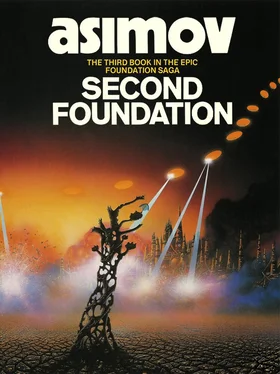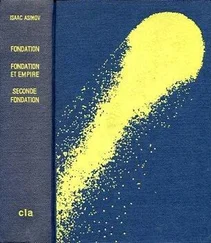“All right. They have good rulers and bad. They’ve conquered a few planets, won some battles, lost a few. There is nothing distinctive about them. I don’t think much of your theory, Channis.”
“But you’ve missed a few points. Didn’t you notice that they never formed coalitions? They always remained completely outside the politics of this corner of the star swarm. As you say, they conquered a few planets, but then they stopped—and that without any startling defeat of consequence. It’s just as if they spread out enough to protect themselves, but not enough to attract attention.”
“Very well,” came the unemotional response. “I have no objection to landing. At the worst—a little lost time.”
“Oh, no. At the worst—complete defeat. If it is the Second Foundation. Remember, it would be a world of space-knows-how-many Mules.”
“What do you plan to do?”
“Land on some minor subject planet. Find out as much as we can about Tazenda first, then improvise from that.”
“All right. No objection. If you don’t mind now, I would like the light out.”
Channis left with a wave of his hand.
And in the darkness of a tiny room in an island of driving metal lost in the vastness of space, General Han Pritcher remained awake, following the thoughts that led him through such fantastic reaches.
If everything he had so painfully decided were true—and how all the facts were beginning to fit—then Tazenda was the Second Foundation. There was no way out. But how? How?
Could it be Tazenda? An ordinary world? One without distinction? A slum lost amid the wreckage of an Empire? A splinter among the fragments? He remembered, as from a distance, the Mule’s shriveled face and his thin voice as he used to speak of the old Foundation psychologist, Ebling Mis, the one man who had—maybe—learned the secret of the Second Foundation.
Pritcher recalled the tension of the Mule’s words: “It was as if astonishment had overwhelmed Mis. It was as though something about the Second Foundation had surpassed all his expectations, had driven in a direction completely different from what he might have assumed. If I could only have read his thoughts rather than his emotions. Yet the emotions were plain—and above everything else was this vast surprise.”
Surprise was the keynote. Something supremely astonishing! And now came this boy, this grinning youngster, glibly joyful about Tazenda and its undistinguished subnormality. And he had to be right. He had to. Otherwise, nothing made sense.
Pritcher’s last conscious thought had a touch of grimness. That hypertracer along the Etheric tube was still there. He had checked it one hour back, with Channis well out of the way.
It was a casual meeting in the anteroom of the Council Chamber—just a few moments before passing into the Chamber to take up the business of the day—and the few thoughts flashed back and forth quickly.
“So the Mule is on his way.”
“That’s what I hear, too. Risky! Mighty risky!”
“Not if affairs adhere to the functions set up.”
“The Mule is not an ordinary man—and it is difficult to manipulate his chosen instruments without detection by him. The controlled minds are difficult to touch. They say he’s caught on to a few cases.”
“Yes, I don’t see how that can be avoided.”
“Uncontrolled minds are easier. But so few are in positions of authority under him—”
They entered the Chamber. Others of the Second Foundation followed them.
Rossem is one of those marginal worlds usually neglected in Galactic history and scarcely ever obtruding itself upon the notice of men of the myriad happier planets.
In the latter days of the Galactic Empire, a few political prisoners had inhabited its wastes, while an observatory and a small naval garrison served to keep it from complete desertion. Later, in the evil days of strife, even before the time of Hari Seldon, the weaker sort of men, tired of the periodic decades of insecurity and danger; weary of sacked planets and a ghostly succession of ephemeral emperors making their way to the Purple for a few wicked, fruitless years—these men fled the populated centers and sought shelter in the barren nooks of the Galaxy.
Along the chilly wastes of Rossem, villages huddled. Its sun was a small ruddy niggard that clutched its dribble of heat to itself, while snow beat thinly down for nine months of the year. The tough native grain lay dormant in the soil those snow-filled months, then grew and ripened in almost panic speed, when the sun’s reluctant radiation brought the temperature to nearly fifty.
Small, goatlike animals cropped the grasslands, kicking the thin snow aside with tiny, tri-hooved feet.
The men of Rossem had, thus, their bread and their milk—and when they could spare an animal, even their meat. The darkly ominous forests that gnarled their way over half of the equatorial region of the planet supplied a tough, fine-grained wood for housing. This wood, together with certain furs and minerals, was even worth exporting, and the ships of the Empire came at times and brought in exchange farm machinery, nuclear heaters, even television sets. The last was not really incongruous, for the long winter imposed a lonely hibernation upon the peasant.
Imperial history flowed past the peasants of Rossem. The trading ships might bring news in impatient spurts; occasionally new fugitives would arrive—at one time, a relatively large group arrived in a body and remained—and these usually had news of the Galaxy.
It was then that the Rossemites learned of sweeping battles and decimated populations or of tyrannical emperors and rebellious viceroys. And they would sigh and shake their heads, and draw their fur collars closer about their bearded faces as they sat about the village square in the weak sun and philosophized on the evil of men.
Then after a while, no trading ships arrived at all, and life grew harder. Supplies of foreign, soft food, of tobacco, of machinery stopped. Vague word from scraps gathered on the hyperbands of their television sets brought increasingly disturbing news. And finally it spread that Trantor had been sacked. The great capital world of all the Galaxy, the splendid, storied, unapproachable and incomparable home of the emperors had been despoiled and ruined and brought to utter destruction.
It was something inconceivable, and to many of the peasants of Rossem, scratching away at their fields, it might well seem that the end of the Galaxy was at hand.
And then one day not unlike other days a ship arrived again. The old men of each village nodded wisely and lifted their old eyelids to whisper that thus it had been in their fathers’ time—but it wasn’t, quite.
This ship was not an Imperial ship. The glowing Spaceship-and-Sun of the Empire was missing from its prow. It was a stubby affair made of scraps of older ships—and the men within called themselves soldiers of Tazenda.
The peasants were confused. They had not heard of Tazenda, but they greeted the soldiers nevertheless in the traditional fashion of hospitality. The newcomers inquired closely as to the nature of the planet, the number of its inhabitants, the number of its cities—a word mistaken by the peasants to mean “villages” to the confusion of all concerned—its type of economy and so on.
Other ships came and proclamations were issued all over the world that Tazenda was now the ruling world, that tax-collecting stations would be established girdling the equator—the inhabited region—that percentages of grain and furs according to certain numerical formulae would be collected annually.
Читать дальше
Конец ознакомительного отрывка
Купить книгу











